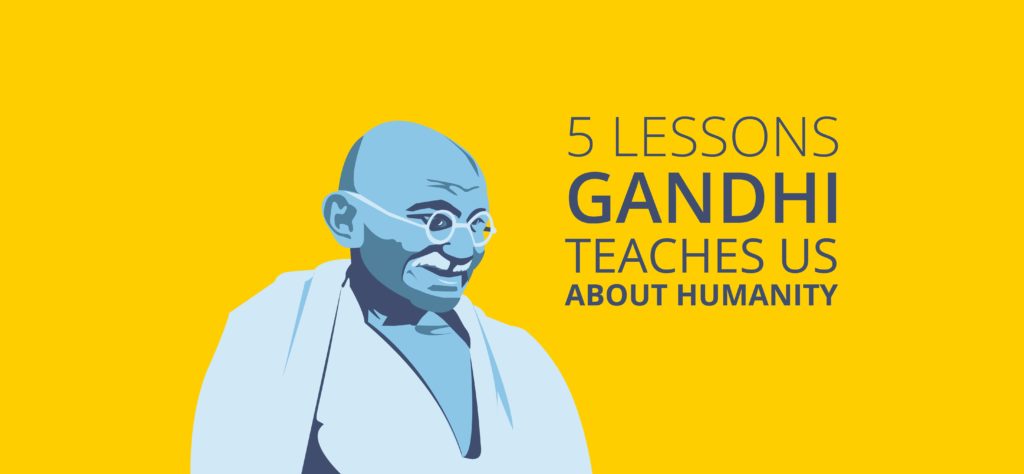5 Lessons Gandhi Teaches Us About Humanity

Born in India in the late 19th century, Mohandas Gandhi, known as ‘Mahatma’ (or ‘Great Soul’) is known for his civil rights leadership. He was the leader of the Indian independence movement in British-ruled India. Although he was killed in 1948, his years of civil disobedience to promote peace have influenced countless other leaders including Martin Luther King, Jr. and Nelson Mandela.
What can Gandhi teach us?
“You must not lose faith in humanity. Humanity is like an ocean; if a few drops of the ocean are dirty, the ocean does not become dirty.”
Gandhi fervently believed in humanity. He trusted and had faith that there were good people in the world. In light of recent terrorist attacks, it has been hard to see that goodness (and much of it) still exists in the world today. But, it does! There is still hope. Gandhi’s words are poignant and true. Though there may be a ‘few drops’ in the ocean that are dirty, the entire ocean does not become dirty.
“A man is but the product of his thoughts. What he thinks, he becomes.”
When you look in the mirror in the morning, what is the first thing you think? If you are standing in a check-out line at the grocery store, what comes to mind as you see the polished figures on magazine covers? If you are faced with sickness, disability, or failure, what do you think about yourself? What are you becoming because of these thoughts? When we immerse ourselves with positive thinking, we will become positive ourselves. If we think that we might fail, we probably will. What we think, we become. Think GOOD thoughts. Think more of yourself. You are doing better than you think.
“As human beings, our greatness lies not so much in being able to remake the world – that is the myth of the atomic age – as in being able to remake ourselves.”
We might feel like our actions are insignificant. It may seem that what we are doing is of no value. Maybe we tell ourselves, “There’s too much bad in the world. It will never change.” Instead of focusing on changing the world, focus on changing yourself. Set goals for how you can improve. If you could change any bad habit, what would it be? Work on remaking yourself first.
“I call him religious who understands the suffering of others.”
Again, with recent devastating events happening in the world it is imperative to look outside of ourselves. When tragedies happen, we unite. We show compassion and love. Pure religion is giving service and being sympathetic to those of different backgrounds, religions, and orientation. Today, try to understand what someone else (a coworker, a neighbor, a family member) might be going through—walk a mile in their shoes. When you ask how they are doing, really listen and seek understanding.
“The weak can never forgive. Forgiveness is the attribute of the strong.”
Have the faith to forgive others. Forgiveness does not make you weak; it is a strength. As you forgive others, you will feel an added measure of power. Forgiveness enables us to move forward with life, in spite of defeat or hurt. As we exercise the faith to forgive others, we will be more at peace in our own lives. Is there someone that you need to forgive who has wronged you? How can you move forward?
Gandhi taught us to never lose faith in humanity, to watch our thoughts, to remake ourselves, empathize with others, and learn to forgive. Gandhi was a wise man whose life lessons far extend past the 79 years he spent spreading messages of peace, acceptance and love on Earth.
Cheri Peacock Hendricks is a graduate of SUU who loves running on trails, baking and social media.
![]()



